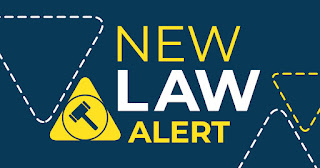Showing posts with label Landlord. Show all posts
Showing posts with label Landlord. Show all posts
Monday, February 17, 2020
Friday, February 07, 2020
Last night, 2/6/2020, we were thrilled to have a packed house attending our new CE - Recent Legal Matters.

While not specifically a course topic, the DOS Guidance's Additional FAQs (updated: 1/31/2020) was brought up by students. Specifically, students inquired about FAQ #5:

While not specifically a course topic, the DOS Guidance's Additional FAQs (updated: 1/31/2020) was brought up by students. Specifically, students inquired about FAQ #5:
5. CAN A LANDLORD’S AGENT COLLECT A “BROKER FEE” FROM THE PROSPECTIVE TENANT? No, a landlord’s agent cannot be compensated by the prospective tenant for bringing about the meeting of the minds. NY RPL § 238-a(1)(a) provides, in part, “no landlord, lessor, sub-lessor or grantor may demand any payment, fee, or charge for the processing, review or acceptance of an application, or demand any other payment, fee or charge before or at the beginning of the tenancy, except background checks and credit checks….” The fee to bring about the meeting of the minds would be a “payment, fee or charge before or at the beginning of the tenancy” other than a background or credit check as provided in this section. Accordingly, a landlord’s agent that collects a fee for bringing about the meeting of the minds between the landlord and tenant (i.e., the broker fee) from the tenant can be subject to discipline.What good timing for this to come up because our course materials included an explanation of the requirements for an agency (DOS) to issue a regulation, which were not undertaken with respect to this Guidance. As such, the Guidance is NOT law, but, instead an agency's interpretation of law. With respect to the Guidance constituting an interpretation rather than law, we explained how and when an agency's interpretation is given deference by the courts who are the co-equal branch of government with the constitutional authority to be the final voice on interpreting statutes (laws). Incident thereto, we shared the following quotes from case law with our students:
It is well settled that “[a]n agency's interpretation of its own regulation ‘is entitled to deference if that interpretation is not irrational or unreasonable’” &
“the question is one of pure statutory reading and analysis, dependent only on accurate apprehension of legislative intent, there is little basis to rely on any special competence or expertise of the administrative agency and its interpretive regulations... And, of course, if the regulation runs counter to the clear wording of a statutory provision, it should not be accorded any weight.”Oh, do we expect a legal battle on this issue. Stay tuned. It's going to get entertaining fast.
Tuesday, December 24, 2019
On December 20, 2019, A2554 was enacted to "[p]rohibit[] commercial leases from including a waiver of the right to a declaratory judgment action and states that the inclusion of such a waiver in a commercial lease shall be null and void as against public policy."
New Real Property Law section 235-h took effect immediately on signing.
Welcome back Yellowstone Injunctions - it's like you never left us in the commercial arena. Commercial tenants facing eviction should consult with an attorney to get an injunction immediately before they are evicted.

New Real Property Law section 235-h took effect immediately on signing.
Welcome back Yellowstone Injunctions - it's like you never left us in the commercial arena. Commercial tenants facing eviction should consult with an attorney to get an injunction immediately before they are evicted.

Saturday, December 21, 2019
On December 20, 2019, Senate Bill S3585 became law.
This bill's purpose is that it "[r]equires gas and electric utility companies to make available to any landlord and lessor of residential rental premises, upon the request of a prospective tenant or lessor of a residential unit, information concerning gas and electric charges incurred from prior occupants of the dwelling."
The bill's justification explains that "[p]eople should have the right to inquire from a gas and electric company the amount of the bills being paid for heat and electric service by the prior customer before they move into a residence. They should not have to rely on a landlord or homeowner's word about how much it costs to heat a residence."
This new law, Public Serivce Law section 66-p, is effective on 4/18/2020.

This bill's purpose is that it "[r]equires gas and electric utility companies to make available to any landlord and lessor of residential rental premises, upon the request of a prospective tenant or lessor of a residential unit, information concerning gas and electric charges incurred from prior occupants of the dwelling."
The bill's justification explains that "[p]eople should have the right to inquire from a gas and electric company the amount of the bills being paid for heat and electric service by the prior customer before they move into a residence. They should not have to rely on a landlord or homeowner's word about how much it costs to heat a residence."
This new law, Public Serivce Law section 66-p, is effective on 4/18/2020.

Tuesday, November 12, 2019
On November 6, 2019, Governor Andrew Cuomo signed Assembly Bill 1646 into law. Assembly Bill 1646 amends the Multiple Residence Law and adds a new Section 302-a. The Multiple Residence Law applies to buildings with three or more units outside New York City.
Effective immediately, the new law prohibits the recovery of rent AND the commencement of an action for possession of a dwelling based on nonpayment of rent if the dwelling or structure occupied for human habitation does not have a certificate of occupancy or is not in compliance with the existing certificate of occupancy pursuant to Multiple Residence Law § 302.
The dwelling may be caused to be vacated for any nuisance or if it is occupied by more families or persons than permitted or is erected or occupied contrary to law. Such dwelling cannot be occupied until it or its occupancy has been made to conform to law.
Apart from a landlord being prohibited from recovering rent and possession of the premises through a nonpayment eviction proceeding, landlords should also be aware that violations may also be fined up to $500 or imprisonment up to a period of one year, or both.
Effective immediately, the new law prohibits the recovery of rent AND the commencement of an action for possession of a dwelling based on nonpayment of rent if the dwelling or structure occupied for human habitation does not have a certificate of occupancy or is not in compliance with the existing certificate of occupancy pursuant to Multiple Residence Law § 302.
The dwelling may be caused to be vacated for any nuisance or if it is occupied by more families or persons than permitted or is erected or occupied contrary to law. Such dwelling cannot be occupied until it or its occupancy has been made to conform to law.
Apart from a landlord being prohibited from recovering rent and possession of the premises through a nonpayment eviction proceeding, landlords should also be aware that violations may also be fined up to $500 or imprisonment up to a period of one year, or both.











